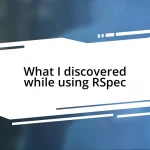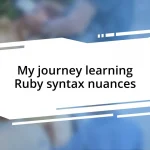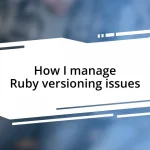Key takeaways:
- Debugging requires a systematic approach, often utilizing methods like the “Five Whys” to identify root causes.
- Recognizing common challenges, such as syntax errors and misunderstood scopes, empowers developers to tackle issues more effectively.
- Utilizing tools like IDEs and logging can significantly enhance clarity and efficiency during debugging sessions.
- Learning from experiences, documenting processes, and collaborating with peers contribute to ongoing improvement in debugging skills.
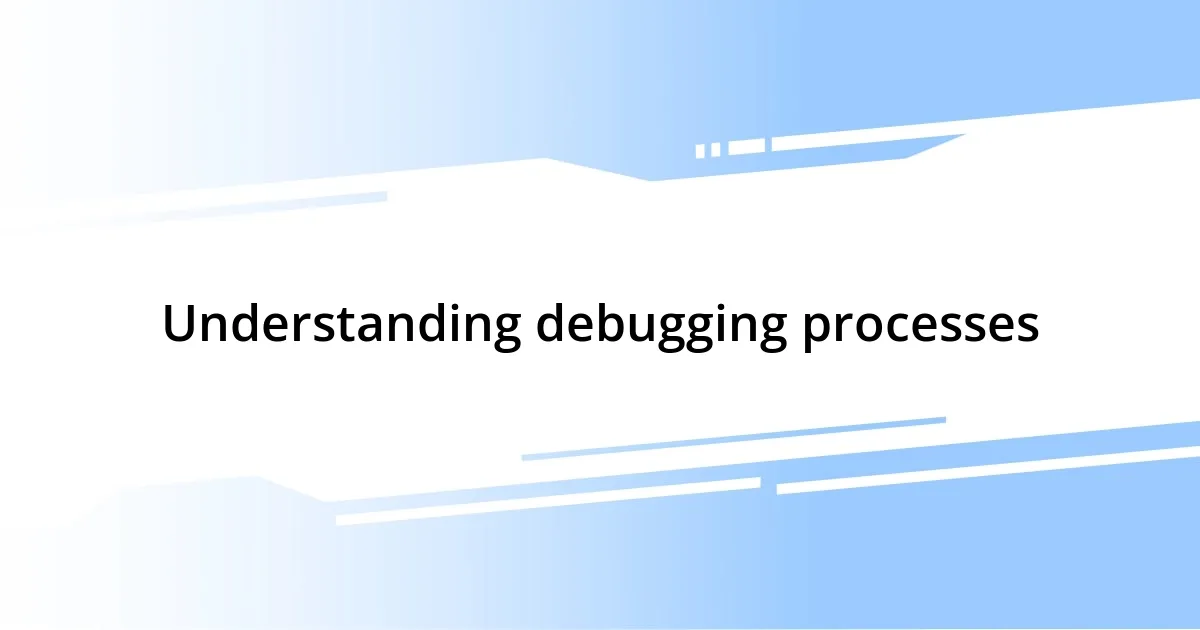
Understanding debugging processes
When I first started coding, debugging felt like trying to find a needle in a haystack. It often seemed overwhelming, like I was wading through an endless sea of error messages and broken logic. Have you ever felt that rush of frustration? I certainly have, but it taught me the importance of breaking down the problem into manageable chunks.
Understanding debugging processes means recognizing that each bug is like a clue, guiding you toward a solution. I remember one particular instance where I spent hours chasing a seemingly minor issue in my code. It turned out to be a misplaced variable. The emotional rollercoaster of discovering the small mistake taught me to appreciate the value of patience and a systematic approach. Isn’t it fascinating how even a tiny detail can derail your work?
There’s a method I often rely on: I call it the “Five Whys.” When I encounter a bug, I ask “why” at least five times to dig into the root cause. It’s surprising how deep that rabbit hole goes! Each answer leads me to a new question, revealing layers of complexity I initially overlooked. This process not only uncovers issues but also deepens my understanding of the code, transforming debugging from a chore into an enlightening experience. Have you tried this approach?
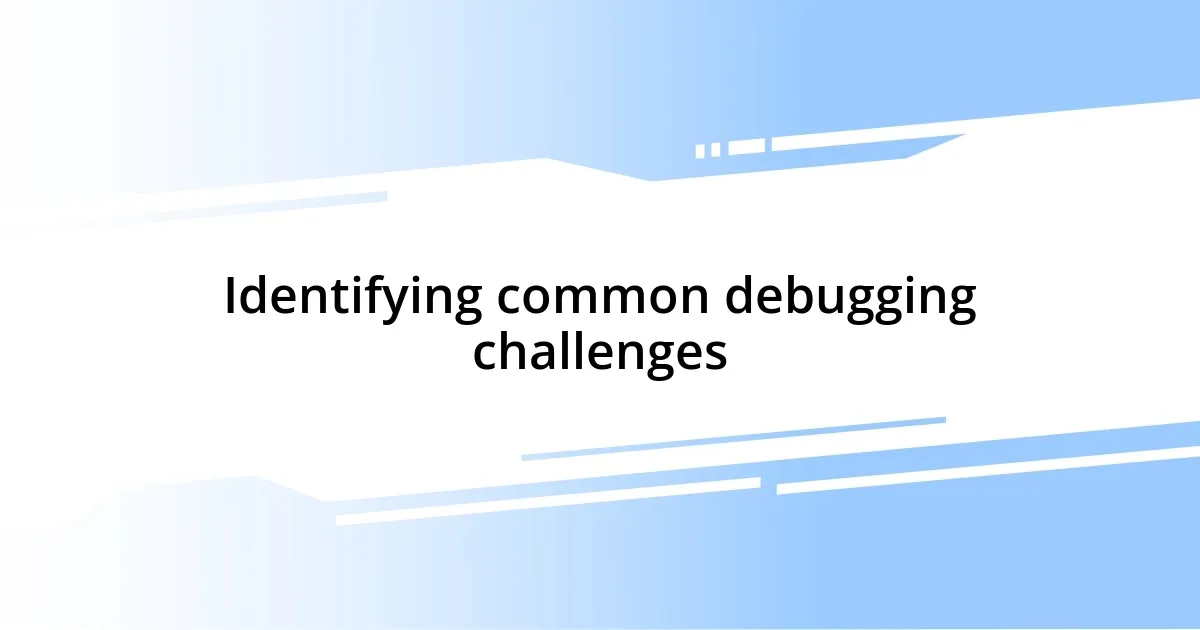
Identifying common debugging challenges
Identifying common debugging challenges is essential in streamlining the debugging process. I recall a time when I spent hours grappling with array index errors—those pesky typos that throw everything off. It’s often easy to overlook these minor mistakes, but they can lead to major headaches. Recognizing patterns in my challenges has been key; I pinpoint specific areas where I tend to struggle, allowing me to approach these obstacles with more confidence.
Here are some typical debugging challenges I’ve encountered:
- Confusing error messages that feel cryptic and unhelpful
- Overlooking small yet crucial syntax errors or typos
- Struggling to reproduce the bug consistently
- Misunderstanding the scope of variables or functions
- Failing to keep track of changes in multiple files during iterations
Each one of these hurdles can trigger feelings of frustration or self-doubt, but I’ve learned to embrace them as part of my growth as a developer. Accepting that it’s all part of the journey helps me stay focused and motivated.
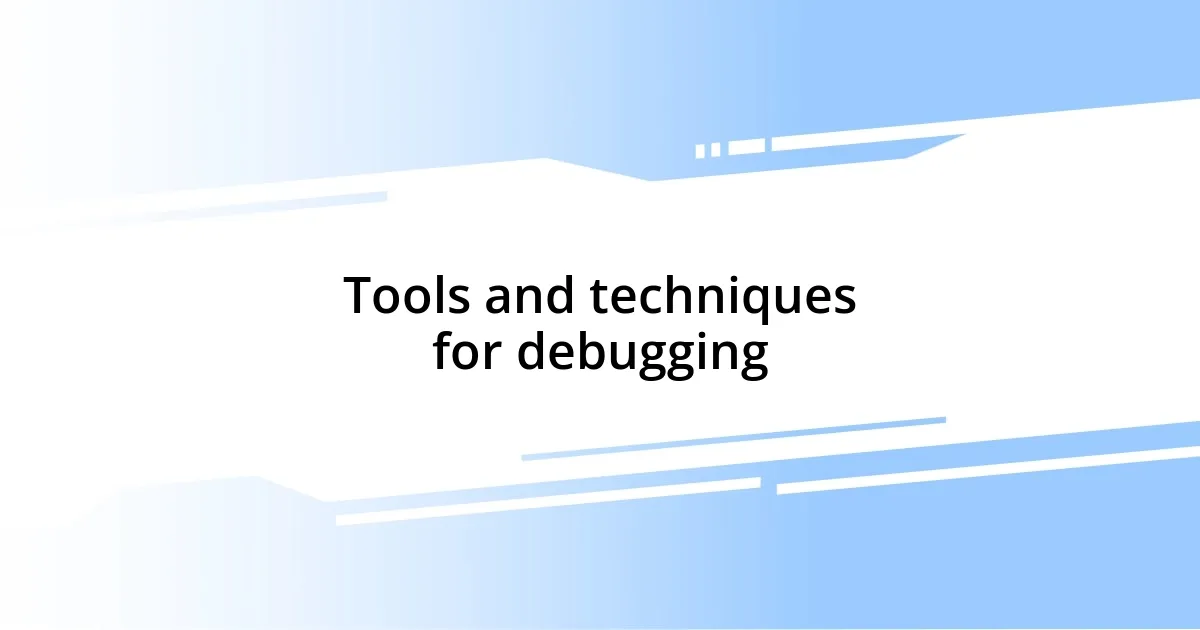
Tools and techniques for debugging
When it comes to tools and techniques for debugging, I find that having the right resources makes a world of difference. One tool I’m particularly fond of is integrated development environments (IDEs) with built-in debugging capabilities—like Visual Studio Code or IntelliJ IDEA. Their user-friendly interfaces allow me to set breakpoints, inspect variables, and step through code line by line. I remember the relief I felt when I first used these tools; it was like turning on the lights in a dark room. Suddenly, I could see exactly what was happening at each step of my code execution. Have you experienced that moment of clarity too?
On the other hand, I’ve also had success with command-line debugging tools, such as GDB for C/C++ or PDB for Python. They may seem intimidating at first, but once you get the hang of them, they offer tremendous power and flexibility. I vividly recall tackling a stubborn segmentation fault, and GDB helped me trace back the problem all the way to an unexpected pointer issue. This experience taught me that sometimes going back to basics can uncover the most elusive bugs. What about you? Have you tried these command-line tools?
| Tool | Type |
|---|---|
| Visual Studio Code | IDE with integrated debugging |
| GDB | Command-line debugging tool |
| PDB | Python command-line debugger |
| Chrome DevTools | Web development debugging |
In addition to tools, there are various techniques that can really sharpen your debugging skills. One approach I advocate is the rubber duck debugging method, which involves explaining your code or problem to an inanimate object. This practice forces you to articulate your thoughts clearly, often leading to sudden realizations about issues that might have been clouded in your mind. I remember a time when talking through my code to a plush duck on my desk helped me identify a logic error I had been staring at for hours. Have you tried talking to an inanimate object, or do you think that sounds too quirky? Trust me; it works wonders!
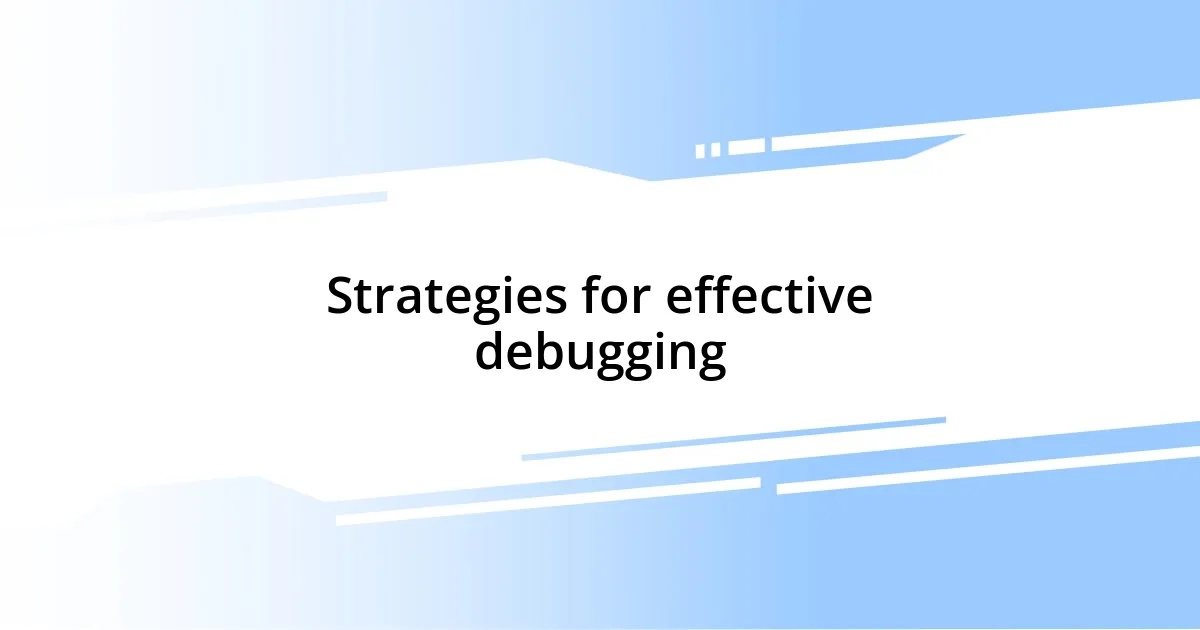
Strategies for effective debugging
One strategy that I’ve found effective is isolating the problem by commenting out sections of my code. When I encounter a bug, I take the time to systematically disable parts of my code to see if the issue persists. This method has often revealed hidden errors that I might have otherwise missed, like a forgotten variable initialization. Have you ever tried this technique and discovered an unexpected culprit?
Another approach includes leveraging version control systems, like Git, to track my changes. Whenever I introduce a bug, I can look back and see what I modified. I remember one frustrating night where I introduced an error while trying to improve performance. By checking my commit history, I was able to pinpoint the changes that created the issue. It’s incredible how this tool not only documents my coding journey but also serves as a safety net in debugging!
Lastly, I believe in the power of taking short breaks. I often step away from my computer when I feel stuck. I can’t count how many times a walk or even a quick shower has led to an “aha!” moment. It’s as if stepping away allows my brain to process things subconsciously and return with fresh eyes. Have you ever experienced this unexpected clarity after a brief pause? It’s a reminder that sometimes, the best solution is to give yourself that space to think.
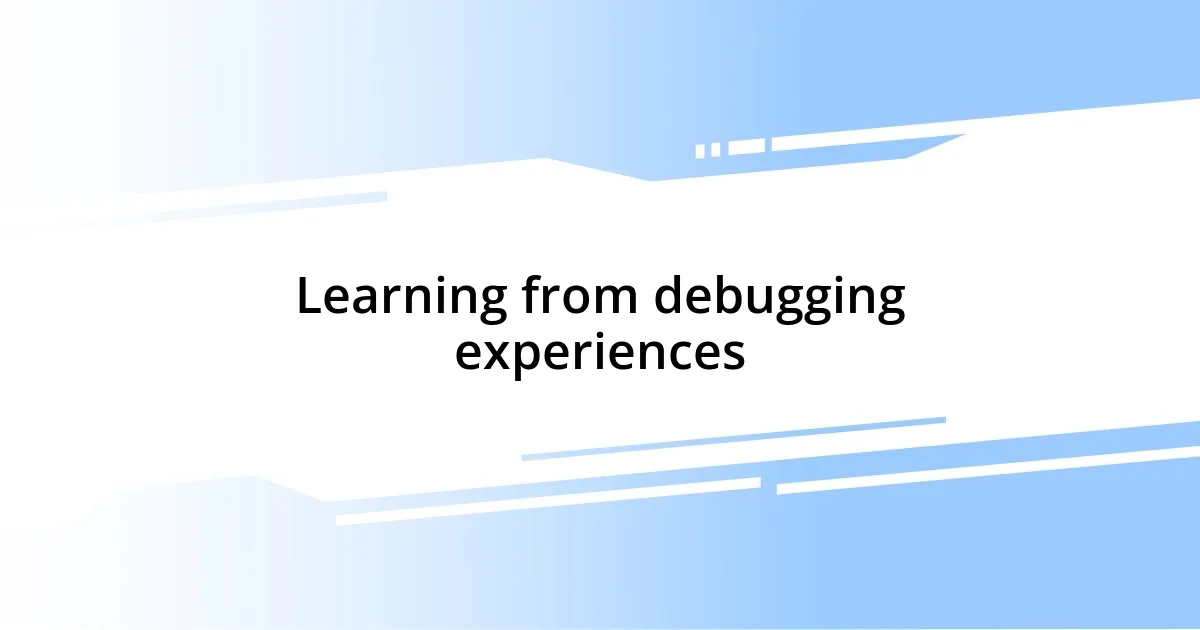
Learning from debugging experiences
Learning from my debugging experiences has always been a rewarding journey. One instance that stands out occurred when I spent hours trying to solve an error that was driving me crazy. After contemplating the issue over coffee, I realized I had overlooked a simple mistake: I hadn’t updated a configuration file. That moment taught me the importance of reviewing the basics before diving deeper into the problem—something I now do as a routine habit. Have you had a similar moment where a simple oversight led to a breakthrough?
Another lesson I’ve embraced is the significance of documenting my debugging processes. I’ve found that keeping a detailed log of the issues I encounter and how I resolve them helps avoid future headaches. There was a time I faced recurring problems with a project, and looking back at my notes not only reminded me of solutions I’d forgotten but also helped me recognize patterns in the errors. This practice fuels not only my growth as a developer but also gives me a sense of accomplishment. Have you ever tried keeping a debugging journal? You might be surprised at what you learn from your own experiences.
Lastly, I’ve realized that collaborating with peers significantly enhances my debugging skills. I vividly recall a frustrating session where a colleague provided a fresh perspective. Together, we dissected the issue, and they pointed out another angle I hadn’t considered, leading to the quick resolution of a pesky bug. This taught me the value of exchanging ideas and seeking help when needed. It’s not just about finding the solution; it’s about growing together through the process. Have you found collaboration to be an effective tool in your debugging arsenal?
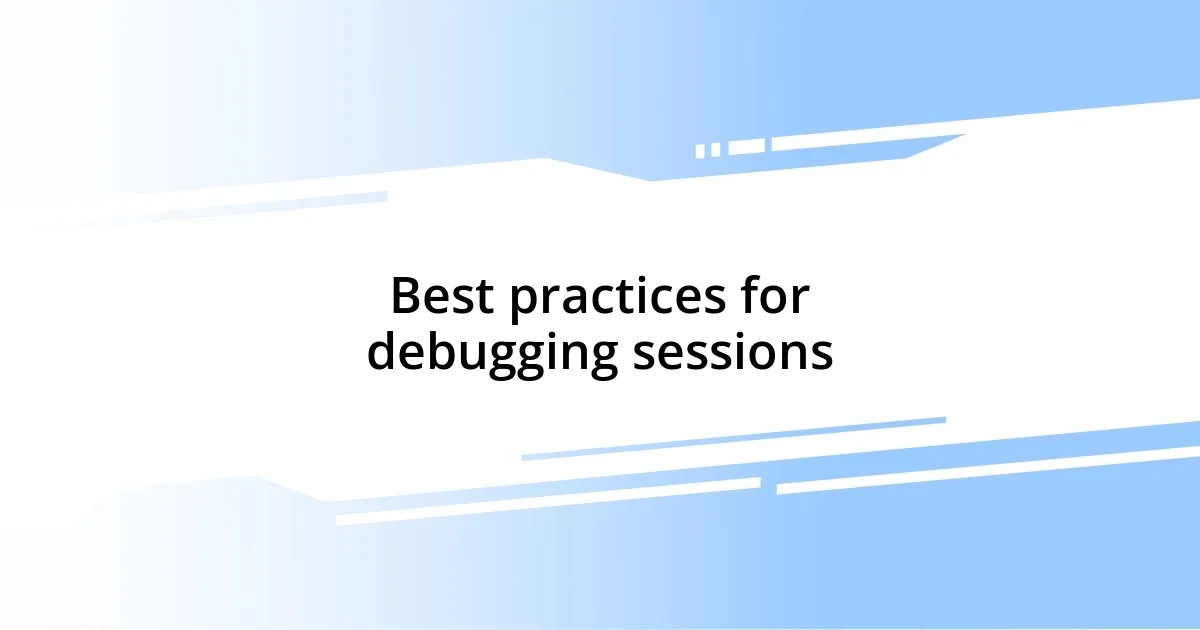
Best practices for debugging sessions
When diving into a debugging session, one best practice I always rely on is to leverage print statements or logging. I remember a particularly puzzling bug where the output was completely off. By adding strategic print statements throughout my code, I was able to see the exact values being processed at various stages. It struck me how often simple visibility can transform a frustrating debugging experience into a clear path to the solution. Have you ever found that just shining a little light on your code makes everything so much clearer?
I’ve also learned the importance of maintaining a focused mindset during debugging sessions. It’s all too easy to get distracted by social media or notifications. During one particularly intense session, I chose to use the Pomodoro technique—25 minutes of deep focus followed by a 5-minute break. That structure not only boosted my productivity but also kept my mind sharp for tackling those stubborn bugs. Have you ever tried to control your environment, and noticed how it changed your approach to solving problems? It’s fascinating how a little intentionality can lead to breakthrough moments.
Lastly, I find it invaluable to revisit the problem after a resolution. Recently, I found myself fixing a complex bug only to realize how it tied back to a misunderstanding of a library’s functionality. Taking time to reflect on past bugs, even after they’ve been solved, allowed me to deepen my understanding. It’s like discovering layers in an onion; every problem solved brings insight into the next challenge. Have you taken the time to reflect on your debugging cases? The lessons can be as rewarding as the solutions themselves.
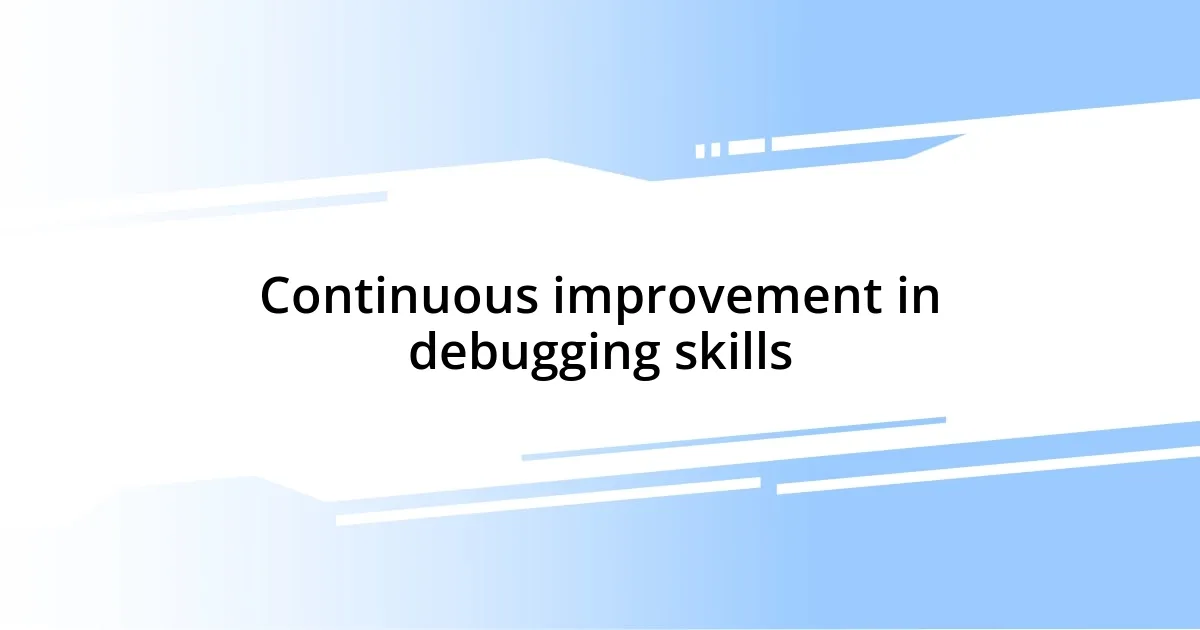
Continuous improvement in debugging skills
I continuously work on honing my debugging skills, often reflecting on past challenges and victories. One time, after stubbornly grappling with a bug for what felt like an eternity, I finally stepped away and revisited it with fresh eyes the next day. It amazed me how a well-rested mind could unravel knots that seemed impossible to untie the night before. Have you ever experienced that clarity that comes with a little distance?
Another aspect of my continuous improvement is actively seeking feedback from my peers. I remember a particularly complex problem I was facing when a colleague and I held an impromptu brainstorming session. Their insights not only helped me discover a solution but also opened my eyes to debugging techniques I’d never considered before. It felt like a light bulb moment, demonstrating how sharing our experiences can accelerate our learning. How often do you tap into your network for different perspectives when debugging?
Finally, I make it a point to set aside time to experiment with new debugging tools and techniques. There was a phase when I dedicated a short period each week to explore tools that I hadn’t used before. This playful approach not only kept my skills sharp but often introduced me to shortcuts and methods that simplified my workflow considerably. It can be easy to stick to what you know, but trying out new solutions can ignite unexpected inspiration. Have you carved out time in your schedule for such experimentation? Sometimes that effort can lead to breakthroughs we never imagine.



